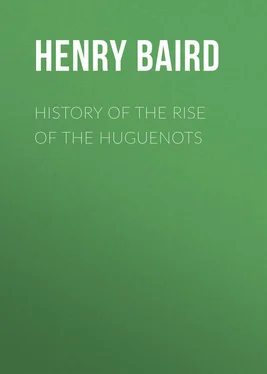Henry Baird - History of the Rise of the Huguenots
Здесь есть возможность читать онлайн «Henry Baird - History of the Rise of the Huguenots» — ознакомительный отрывок электронной книги совершенно бесплатно, а после прочтения отрывка купить полную версию. В некоторых случаях можно слушать аудио, скачать через торрент в формате fb2 и присутствует краткое содержание. ISBN: , Жанр: foreign_antique, foreign_prose, на английском языке. Описание произведения, (предисловие) а так же отзывы посетителей доступны на портале библиотеки ЛибКат.
- Название:History of the Rise of the Huguenots
- Автор:
- Жанр:
- Год:неизвестен
- ISBN:http://www.gutenberg.org/ebooks/30708
- Рейтинг книги:4 / 5. Голосов: 1
-
Избранное:Добавить в избранное
- Отзывы:
-
Ваша оценка:
- 80
- 1
- 2
- 3
- 4
- 5
History of the Rise of the Huguenots: краткое содержание, описание и аннотация
Предлагаем к чтению аннотацию, описание, краткое содержание или предисловие (зависит от того, что написал сам автор книги «History of the Rise of the Huguenots»). Если вы не нашли необходимую информацию о книге — напишите в комментариях, мы постараемся отыскать её.
History of the Rise of the Huguenots — читать онлайн ознакомительный отрывок
Ниже представлен текст книги, разбитый по страницам. Система сохранения места последней прочитанной страницы, позволяет с удобством читать онлайн бесплатно книгу «History of the Rise of the Huguenots», без необходимости каждый раз заново искать на чём Вы остановились. Поставьте закладку, и сможете в любой момент перейти на страницу, на которой закончили чтение.
Интервал:
Закладка:
348
Edict of Vincennes, June 14, 1563, and Declarations of Paris, Dec. 14, 1563; of Lyons, June 24, 1564; and of Roussillon, Aug. 4, 1564. Isambert, Recueil des anc. lois. franç., xiv. 141, 159, 170-172, and Drion, Hist. chronol., i. 102-108. See Jean de Serres, iii. 35-41, 55-63, and after him, De Thou, iii. (liv. xxxv.) 411, 412, 504, 505.
349
Jean de Serres, iii. 54, 55, 64, 65, etc. De Thou, iii. (liv. xxxvi.) 503, etc.
350
Ibid., ubi supra . There are no similar cases of assassination on the part of Huguenots at this period. That of Charry at court seems to have resulted partly from revenge for personal wrongs, partly from mistaken devotion on the part of one of D'Andelot's followers to his master's interests. See Languet, letter of Feb. 3, 1564, Epist. secr., ii. 284.
351
Jean de Serres, iii. 65-82; De Thou, iii. (liv. xxxvi.) 505; Lettres de Monseigneur le Prince de Condé à la Roine Mère du Roy, avec Advertissemens depuis donnéz par ledit Seigneur Prince à leurs Majestez, etc, (Aug. 31, 1564, etc.), Mém. de Condé, v. 201-214.
352
"Articles respondus par le Roy en son Conseil privé, sur la requeste présentée par plusieurs habitans de la ville de Bourdeaux," etc. The signature of the secretary, Robertet, was affixed Sept. 5, 1564; but such was the obstinacy of the judges of Bordeaux, that the document was not published in the parliament of that city until nearly eight months later (April 30, 1565). Mém. de Condé, v. 214-224. Cimber et Danjou, Archives curieuses, vi. 271-278. The Protestants petitioned for another town in place of St. Macaire, which had been assigned them for their religious worship – the most inconveniently situated in the entire "sénéchaussée." They desired a city which they could go to and return from on the same day. They stated that "la plus grande partie des plus notables familles de la ville de Bourdeaux est de la religion réformée." This part of their request the king referred to the judgment of the governor.
353
Ordonnance du roi Charles IX., 6 août, 1564, Nantes MS., Bulletin, xiii. (1864), 203, 204.
354
Aymon, i. 277, 278, and Cimber et Danjou, Archives cur., vi. 167. As by this time both Papists and Huguenots knew Catharine de' Medici to be a woman utterly devoid of moral principle, it may fairly be considered an open question whether there was any one in France more deceived than she was in supposing that she had deceived others.
355
Sir Thomas Smith to the queen, from Tarascon (near Avignon), Oct. 21, 1564, enclosing "Articles of pacification for those of the religion in Venaissin and Avignon agreed to by the ministers of the Pope and those of the Prince of Orange, Oct. 11, 1564." Signed by the vice-legate, Bishop of Fermo, and Fabrizio Serbellone, State Paper Office.
356
Journal d'un curé ligueur (Jehan de la Fosse), 55, 56, 68.
357
"Lundi passé, viiie du present mois, ung peu avant les trois heures après midy, monsieur le révérendissime cardinal de Lorraine, vestu du robbon et chappeau, … est entré en Paris." Account written two days after the occurrence by Del Rio, attached to the Spanish embassy in Paris. Papiers d'état du card. de Granvelle, viii. 600-602.
358
Mém. de Castelnau, liv. vi., c. iii.; Jean de Serres, iii. 85, 86; De Thou, iii. (liv. xxxvii.) 533-537; Mém. de Claude Haton, i. 381-383; Journal de Jehan de la Fosse, 70-72; Condé MSS., in Duc d'Aumale, Princes de Condé, i. 518; Le Livre des Marchands (Ed. Panthéon) 424, 425, where the ludicrous features of the scene are, of course, most brightly colored. "J'espère bien aussi m'en resentir ung jour," wrote the cardinal himself, a few weeks later, from Joinville. Pap. d'état du card. de Granvelle, viii. 681.
359
Jehan de la Fosse, 72.
360
Harangue de l'Admiral de France à Messieurs de la Cour de Parlement de Paris, du 27 janvier 1565, avec la réponse. Papiers d'état du card. de Granvelle, viii. 655-657. M. de Crussol, in a letter of February 4, 1565, alludes to the admiral's flattering reception by the clergy and by the Sorbonne, "qui sont allé le visiter et offert infiny service;" and states that both parties were gratified by the interview. Condé MSS., in Duc d'Aumale, Princes de Condé, Pièces inédits, i. 520.
361
Philip II. to Alva, Dec. 14, 1563, Pap. d'état du card. de Granvelle, vii. 269; Alva to Philip II., Dec. 22, 1563, ib., vii. 286, 287.
362
Granvelle to the Baron de Bolwiller, March 13, 1565, ib., ix. 61, 62.
363
Ibid., ubi supra . "Je vous asseure, comme il est véritable, qu'il n'y a aultre chose en cecy que simple visitation de fille à mère."
364
Prof. Kluckholn, strangely enough, speaks of Jean de Serres's Commentarii de statu relig., etc., as "zuerst im Jahre, 1575, erschienen" (Zur Geschichte des angeb. Bündnisses von Bayonne, Abhand. der k. bayer. Akademie, München, 1868, p. 151). I have before me the earlier edition of 1571, containing verbatim the passage he quotes, with a single unimportant exception – "ecclesiarum" instead of "religiosorum."
365
J. de Serres, Comment, de statu reipublicæ et religionis in Gallia regno, Carolo IX. rege (1571), iii. 92. The Prince of Condé, in his long petition sent to Charles, Aug. 23, 1568, at the outbreak of the Third Civil War, says expressly in reference to events a year preceding the Second War: "Quandoquidem ego et alii Religionis reformatæ viri fuerimus jampridem admoniti de inito Baionæ consilio cum Hispano, ad eos omnes plane delendos atque exterminandos qui Religionem reformatam in tuo regno profiteantur." Ibid., iii. 200.
366
The remark is said to have been accidentally overheard by Henry of Navarre, afterward Henry the Fourth, of whose presence little account was taken in consequence of his youth. (He was just eleven years and a half old.) But his intimate follower, Agrippa d'Aubigné, would have been likely to give him as authority, had this been the case. He only says: "Les plus licentieux faisoient leur profit d'un terme du Duc d'Alve à Baionne, que dix mille grenouilles ne valloient pas la teste d'un saumon." Hist. univ., liv. iv., c. v. (i. 206). Jean de Serres, ubi supra , iii. 125, gives the expression in nearly the same words: "Satius esse unicum salmonis caput, quam mille ranarum capita habere."
367
Smith to Leicester and Cecil, July 2-29, 1565, State Paper Office, Calendar, 403.
368
"On apelloit ce bon prélat 'le cardinal des bouteilles,'" says Lestoile, "pource qu'il les aimoit fort, et ne se mesloit guères d'autres affaires que de celles de la cuisine, où il se connoissoit fort bien, et les entendoit mieux que celles de la religion et de l'estat." In chronicling the death of Louis, Cardinal of Guise, at Paris, March 29, 1578, he records the suggestive fact that "he was the last of the six brothers of the house of Guise; yet died he young, at the age of forty-eight years." Journal de Henri III., p. 96 (edit. Michaud). So closely is the scriptural warning fulfilled, that "bloody and deceitful men shall not live out half their days." Cardinal Guise (not Cardinal Lorraine, as Mr. Henry White seems to suppose, Massacre of St. Bartholomew, Am. edit., 187, 188) was the abettor of the massacre of Vassy.
369
Cartas que el Duque de Alba scrivió, etc. Papiers d'état du cardinal de Granvelle, ix. 296.
Читать дальшеИнтервал:
Закладка:
Похожие книги на «History of the Rise of the Huguenots»
Представляем Вашему вниманию похожие книги на «History of the Rise of the Huguenots» списком для выбора. Мы отобрали схожую по названию и смыслу литературу в надежде предоставить читателям больше вариантов отыскать новые, интересные, ещё непрочитанные произведения.
Обсуждение, отзывы о книге «History of the Rise of the Huguenots» и просто собственные мнения читателей. Оставьте ваши комментарии, напишите, что Вы думаете о произведении, его смысле или главных героях. Укажите что конкретно понравилось, а что нет, и почему Вы так считаете.












